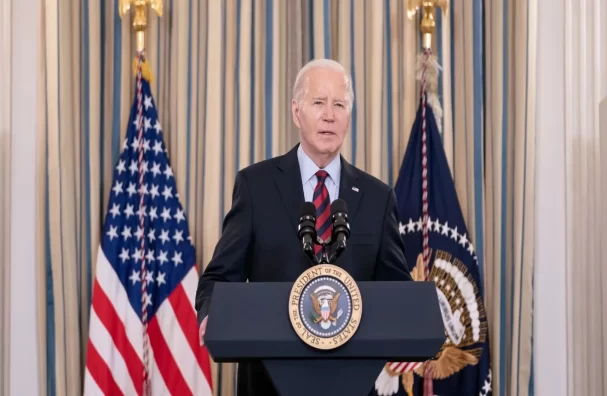
President Joe Biden has taken a firm stance, asserting that “violent protest is not protected.” His remarks come as a response to the growing concerns over the potential threat to free speech and campus safety posed by these demonstrations.
During a recent press conference, Biden unequivocally condemned the use of violence as a means of expression, stating:
“Violent protest is not protected. It’s antithetical to the very principles upon which our nation was founded. While we wholeheartedly uphold the right to peaceful assembly and free speech, any act of aggression or destruction will not be tolerated.”
The President’s remarks underscore the delicate balance between safeguarding civil liberties and maintaining order, a challenge that has long plagued institutions of higher education.
Recent years have witnessed a surge in campus protests, with students and activists voicing their concerns on a wide range of issues, from racial injustice and climate change to tuition hikes and academic freedom. While many of these demonstrations have been peaceful, others have escalated into confrontations with law enforcement, property damage, and disruptions to campus operations.
- University of California, Berkeley: In 2017, protests against a scheduled appearance by a controversial speaker turned violent, resulting in numerous injuries and property damage.
- Evergreen State College: In 2017, student protests over racial issues led to the temporary closure of the campus and the resignation of the college’s president.
- University of Missouri: In 2015, protests over racial tensions and the university’s handling of incidents led to the resignation of the system’s president and chancellor.
These high-profile cases have ignited a national debate on the boundaries of free speech, the role of universities in addressing societal issues, and the appropriate response to disruptive protests.
Biden’s remarks highlight the ongoing challenge of striking a balance between upholding the cherished principles of free speech and ensuring the safety and well-being of students, faculty, and staff on college campuses.
Institutions of higher education have long been bastions of free expression and intellectual discourse. However, the line between protected speech and unacceptable conduct can often blur, particularly when protests turn disruptive or violent.
Opponents of Biden’s stance argue that any restriction on protest, even in the face of violence, could set a dangerous precedent and infringe upon the fundamental right to free speech. They contend that universities should foster an environment where diverse viewpoints can be expressed and debated, even if they are controversial or offensive to some.
On the other hand, proponents of Biden’s stance assert that the safety and security of the campus community should be the top priority. They argue that violent protests not only pose a physical threat but also create an atmosphere of fear and intimidation, undermining the very purpose of universities as centers of learning and intellectual growth.
Moreover, the potential for property damage and disruptions to academic activities can have far-reaching consequences, impacting the educational experience of students and the overall functioning of the institution.
As the debate rages on, universities find themselves caught in the crosshairs, tasked with navigating the complex terrain of free speech, campus safety, and their institutional values.
Many universities have responded by developing comprehensive policies and protocols to address disruptive protests. These measures often involve close collaboration with law enforcement agencies, clear communication of expectations to the campus community, and the establishment of designated protest zones.
However, critics argue that such policies can be overly restrictive and stifle legitimate forms of dissent, potentially chilling free speech on campuses.
Others advocate for a more proactive approach, emphasizing the importance of fostering open dialogue, mutual understanding, and conflict resolution skills among students and faculty. By creating platforms for respectful discourse and addressing underlying grievances, universities can potentially defuse tensions before they escalate into disruptive or violent protests.
The campus unrest and the debate surrounding it reflect broader societal tensions and polarization. As the nation grapples with deep-rooted issues such as systemic racism, economic inequality, and political divides, college campuses have become microcosms of these larger conflicts.
The protests on campuses are often seen as extensions of broader social movements and national conversations. For example, the Black Lives Matter movement and the resurgence of activism around racial justice have resonated strongly on college campuses, fueling protests and demands for institutional change.
Social media has also played a significant role in amplifying campus protests and shaping the narrative surrounding them. Viral videos and hashtags have raised awareness of specific incidents, galvanizing support or backlash from various corners of the internet.
However, the rapid dissemination of information and the potential for misinformation or exaggeration have also contributed to heightened tensions and polarization.
As the nation grapples with these complex issues, it is evident that finding common ground and fostering constructive dialogue will be crucial in addressing campus unrest and preserving the integrity of higher education.
Universities must reaffirm their commitment to upholding core values such as academic freedom, intellectual curiosity, and the pursuit of knowledge. By fostering an environment where diverse perspectives can be respectfully shared and debated, they can potentially diffuse tensions and promote mutual understanding.
Effective solutions will require the active engagement of all stakeholders, including students, faculty, administrators, law enforcement, and the broader community. By working collaboratively and embracing a spirit of compromise, universities can develop comprehensive strategies that balance the need for free speech with the imperative of campus safety.
While violent protests should not be condoned, it is essential to recognize the legitimate grievances and concerns that often underlie these demonstrations. By embracing constructive dissent and creating channels for meaningful dialogue, universities can address the root causes of unrest and work towards positive change.
